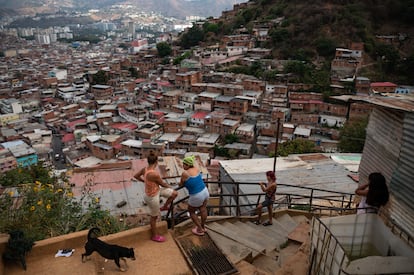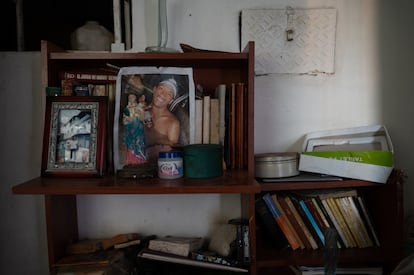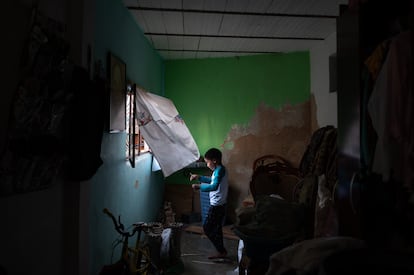‘They pissed off the wrong mother’: Venezuelan women organize for justice
Relatives of young men killed in Caracas by security forces take their cases to the International Criminal Court


Omar was playing cards with four friends when the police broke into the house and killed them all. The five young men died on July 31, 2022, in the Caracas neighborhood of Petare. Omar’s mother, Urselis Valdez, wasn’t given access to the case file until eight months later. She remembers the day when she went to the police station to look for her son, because she was told he had been taken alive. But she found his dead body in a hospital, riddled with bullets. “I still feel pretty bad, I mourn my son every day. But I’m not going to let his death go unpunished,” said Valdez, standing next to Lina Rivera and Carmen Arroyo. The three women met because they all had relatives killed by the police and are now supporting each other on the lonely and rocky road to justice.
The stories of these women are among the 2,000 testimonies presented to the International Criminal Court (ICC) in early 2023 when it resumed its investigation into alleged crimes against humanity in Venezuela. So much documentation and video footage was submitted to the ICC prosecutor that the court extended the deadline for processing and responding to each case. A decision from the ICC is expected by the end of April.
The ICC is investigating cases of political persecution, arbitrary detentions, sexual violence and torture since 2014, the year when political unrest first surged during President Nicolás Maduro’s administration. Human rights organizations and victims are pushing for the court to consider killings during protests and security operations, to determine whether Venezuela has a pattern and policy of exercising excessive force. Several reports by the Office of the UN High Commissioner for Human Rights (UNHCHR) and a UN independent fact-finding committee have already made this determination and called for the government to disband the special forces unit (FAES) of the Bolivarian National Police.

Extrajudicial killings escalated during the Venezuelan government’s military and police raids from 2015 to 2017 to combat crime. The country had become one of the most violent places in the region and the world. Then they unleashed the FAES, and civilian deaths during police confrontations became the major cause of homicides in the country. The humanitarian crisis brought on by the Maduro regime has triggered an intense outbound migration, resulting in lower crime rates and deaths at the hands of the police. But activist Marino Alvarado says this is no reason to believe the country’s security forces are more restrained now. “They shuffled some officials to different positions and changed the name of the FAES, but it still exists,” he said.
A recent report by two civil society organizations – ONGA Provea and the Centro Gumilla Foundation – documented 824 cases of “extrajudicial executions” in 2022, down from over 3,000 victims in 2020. Most of the victims were between the ages of 18 and 30. The tactics and abusive practices of years past are back again, they say. “Massive raids with no warrants, search and seizures, and arbitrary detentions are back again. Since the massacre in La Vega two years ago, officials no longer report the number of people killed and detained during the raids. The Ombudsman’s Office, which is supposed to defend the public, never demands government investigations into the serious human rights violations that are happening during these extrajudicial executions,” said Alvarado.
Miyanllela Fernández’s 23-year-old son Richard was one of those killed during the La Vega massacre. Ríchard repaired tires for a living and had no criminal record. Fernández watched him die from the small window in her home where she keeps a bird cage. In January 2021, 24 people were killed during the police raid in this western Caracas neighborhood. “They went on a rampage against our young people,” said Fernández, recalling that day. None of the criminal gang members that control the area were arrested or killed.
“There’s a pattern,” said Alvarado. “Young males from marginalized areas are the primary victims of institutional violence.” Carmen Arroyo lost her only son, Christian, on September 24, 2018, when he was returning in the early hours of the morning from a birthday party and ran into 20 officers. She elaborates on Alvarado’s profile of the victims. “Young and poor kids from slums with brown skin, tattoos and frizzy hair. That makes them criminals to the police,” she said angrily. Arroyo leads Madres Poderosas (Powerful Women), an organization of people who have lost loved ones to extrajudicial executions. Most are women with sadness in their eyes and the tattooed names of their murdered sons on their arms.
“He was shot coming up the stairs even though he raised his hands so they wouldn’t kill him. This happens every day – all the time.” Arroyo explains that her son was a barber who liked to play basketball. The court near his home in the La Dolorita neighborhood now has a mural in his memory. “It’s the same pattern – first they kill someone and then accuse them of a crime. They invent crimes for their police records so they can say they were delinquents,” said Arroyo. “But they murdered the wrong son and pissed off the wrong mother. I will not stop – I’m now my son’s voice.” She says the only officer accused of Christian’s death is still on active duty while his trial is underway. Investigations into other cases are just starting. “We are all alone in this fight,” said Fernández. “Every one or two weeks we go to the Prosecutor’s Office together and ask questions.”

Every six months in 2018 and 2019, Lina Rivera buried a relative killed by police — five in all. First her nephew Jordan, then her son Jesús and her son-in-law Kevin. Next came another nephew, Joshua, and her brother, Dani. The night before her son Jesús was murdered, Rivera heard something that sounded like a cicada flying over her home in Petare. It was a police drone surveilling a massive deployment in several neighborhoods that left more than a dozen dead. Children and women were yanked out of their homes. Officials arrested men with no warrants. The police claimed that people were resisting arrest, but Jesús was bathing when the police showed up. Lina claims witnesses saw the police plant a bag of drugs, a shotgun and a 38-caliber revolver next to his body. “There was a lot of shooting – they even had snipers on the rooftops. They killed a lot of people around Petare that day. When we went to claim my son’s body, the morgue was overwhelmed.”
Progress and setbacks
The Venezuelan government has repeatedly denied crimes were committed that can be prosecuted by the ICC under the Rome Statute. As the process slowly moved into the formal investigation phase, the Maduro administration repeatedly tried to thwart progress. In early April, the ICC prosecutor rejected Venezuela’s brief filed in February that called the allegations of crimes against humanity “fallacies of the media and geopolitical aggression.”
The Venezuelan government has demanded an end to the ICC investigation, which was reopened last November after several attempts to block it. But the ICC rejected that demand, noting that there have been no prosecutions of those responsible in the chains of command, and no evidence of any convictions or victim reparations. In early 2022, the ICC opened a technical office in Caracas to advise the Venezuelan government on judicial reforms.
“Security operations became systematic and widespread attacks against the civilian population,” claims Ezequiel Monsalve, an attorney with Defiende Venezuela, a non-profit group that collaborates with the Crimes Against Humanity Observatory, a Venezuelan organization documenting these cases for the ICC. “Far from being a public safety policy, it’s a social control policy,” said Monsalve. “And although the number of deaths fell after FAES was disbanded, other abuses have increased, like torture, cruel treatment, attacks on property, sexual violence and arbitrary detentions.”
The ICC’s outright rejection of the Venezuelan government’s motion in early April prompted it to appeal the decision and request the right to present a new motion by April 20. Yet another gambit in Maduro’s political game to maintain his tarnished image abroad.

Sign up for our weekly newsletter to get more English-language news coverage from EL PAÍS USA Edition
Tu suscripción se está usando en otro dispositivo
¿Quieres añadir otro usuario a tu suscripción?
Si continúas leyendo en este dispositivo, no se podrá leer en el otro.
FlechaTu suscripción se está usando en otro dispositivo y solo puedes acceder a EL PAÍS desde un dispositivo a la vez.
Si quieres compartir tu cuenta, cambia tu suscripción a la modalidad Premium, así podrás añadir otro usuario. Cada uno accederá con su propia cuenta de email, lo que os permitirá personalizar vuestra experiencia en EL PAÍS.
¿Tienes una suscripción de empresa? Accede aquí para contratar más cuentas.
En el caso de no saber quién está usando tu cuenta, te recomendamos cambiar tu contraseña aquí.
Si decides continuar compartiendo tu cuenta, este mensaje se mostrará en tu dispositivo y en el de la otra persona que está usando tu cuenta de forma indefinida, afectando a tu experiencia de lectura. Puedes consultar aquí los términos y condiciones de la suscripción digital.








































